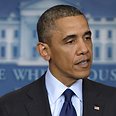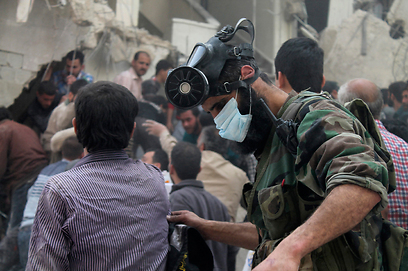All the red lines have been crossed in Syria: Legally, morally and from a humane standpoint. The red has turned into dark purple even before chemical weapons were thrown into the arena, but the world looks on – as though the 70,000 deaths up to this point (according to UN data) are not proof enough that the most horrific event in recent times is taking place right under the world's nose.
The US knows. So does Obama. Hundreds of Syrian exiles are knocking every day on the doors of policy makers in Washington and present photos from the ground: Citizens going up in flames, children being massacred, people being bombarded. Satellite images and the refugees who have fled do not leave any room for doubt: The Syrian president is employing the darkest methods.
President Obama is shocked – but so far his contribution to the Syrian people has mostly been limited to nice words, in addition to the occasional shipment of military equipment for the rebels. What the president has not done is set clear lines for Assad: He has not presented an ultimatum and he has not ordered the military to warm up the engines of the fighter jets.
Obama's red line is amazingly flexible. Every time he moves it a little, mainly because he believes Assad will not dare cross it. But Assad is crossing it without batting an eye.
Obama's dilemma is complex. No one in the US administration can say that Assad is the worst of the lot: The Syrian opposition is comprised of extremist Islamist groups that are linked to al-Qaeda and aspire to establish an extremist Islamic state based on sharia law.
Not all those who oppose Assad are friends of the West, and the last thing Obama wants to do is topple a dictator and get a terrorist despot in his place. The dilemma is intensified by the Iranians, who are monitoring the developments in Syria - trying to gauge the power of the American president's threat and figure out whether he will dare to act against them.
Obama does not want to get his army involved, yet again, in a conflict on the other side of the world, particularly when he is about to end the war in Afghanistan and free the American defense budget from the heavy burden of two wars.
He also remembers what happened in Iraq, when there was intelligence indicating the existence of weapons of mass destruction, which were never found. This is why he is declaring that he will attempt every diplomatic maneuver before setting Damascus on fire.
The White House has examined the alternatives vis-à-vis Syria, and what is certain is that there will not be a ground invasion. An aerial attack is also problematic: The bombing of the chemical weapons caches will result in the very catastrophe they are trying to avoid, and the air in the Middle East will be poisoned.
The White House prefers the plan involving a regime change, but today this plan appears to be more pretentious than ever. In order to topple the regime in Damascus Obama would need a broad coalition that includes Russia. But Moscow is in no rush, and in the American capital they are waiting for further proof of chemical weapons use, as though the evidence they already have is not enough.

















